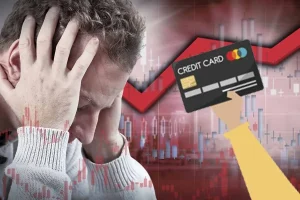The financial landscape in the US can be both enticing and perilous, particularly when it comes to managing credit card debt. This seemingly small plastic card can offer convenience and security, but it also has the potential to lead unsuspecting individuals into a financial trap.
Understanding the pitfalls associated with revolving credit can help you avoid dire consequences and maintain a healthy financial profile. Navigating through the complexities of credit cards requires a sound understanding of interest rates, fees, and repayment strategies.
The allure of immediate purchasing power can overshadow the consequences of accruing significant balances on credit cards, leading many borrowers into unmanageable situations. The first step towards financial literacy involves recognizing these dangers and committing to responsible credit practices.
Understanding the Lure of Easy Credit

The convenience and simplicity of obtaining a credit card make it an attractive option for many Americans. Promotional offers, reward points, and the promise of financial flexibility attract consumers who might not fully grasp the long-term implications of high-interest rates and fees. This allure can lead to overspending, as the tangible aspect of cash is substituted with an abstract line of credit.
Consequently, it becomes easy to lose track of expenditures, piling up balances that can accrue interest swiftly. Understanding the psychological factors of spending with credit cards is crucial. Unlike debit cards, which directly deduct amounts from your bank account, credit cards delay the financial impact, sometimes leading to a false sense of financial capability.
Moreover, the marketing tactics used by credit card issuers play a significant role. They highlight immediate gratification while downplaying the risks, which can easily sway even the most cautious spenders. It is essential to remain prudent and use credit as a tool rather than an unrestricted resource.
Avoiding the Minimum Payment Trap
One major pitfall in managing credit card debt is the minimum payment trap. Credit card companies often encourage borrowers to pay the minimum amount due each month. While it may seem manageable, consistently making only minimal payments results in substantial interest accumulation over time. This practice extends the length of debt repayment significantly.
By only paying the minimum, you essentially prolong your indebtedness and pay more in interest than the principal amount borrowed. It’s a vicious cycle that can drain your financial resources and limit your ability to build savings or invest in other areas.
To avoid this, strive to pay more than the minimum required each billing cycle. Establishing a disciplined payment strategy, such as treating your credit card like a debit card and paying the full balance each month, can prevent the escalation of debt. Creating a budget and tracking expenses also provide a clear picture of your spending habits.
Effective Strategies for Repaying Credit Card Balances
Developing effective repayment strategies is essential for managing and ultimately eliminating credit card debt. One popular method is the debt avalanche approach. This involves prioritizing the repayment of debts with the highest interest rates. By focusing on these balances first, you reduce the amount of interest you pay over time, which accelerates the overall repayment process.
Another effective method is the debt snowball strategy. This approach focuses on paying off the smallest debt balances first, giving you early victories that can motivate you to continue reducing your debt. These small wins can provide the psychological boost needed to stick with your repayment plan.
Additionally, consider consolidating your debt through a lower-interest personal loan. This approach can simplify your payments, reduce your interest rate, and help you become debt-free faster. However, it’s vital to avoid accumulating new debt during the repayment process to ensure long-term financial health.
Building Financial Resilience
Building financial resilience involves more than just eliminating debt; it requires a proactive and comprehensive approach to personal finance. One key aspect is establishing an emergency fund. This fund serves as a financial cushion, allowing you to handle unforeseen expenses without resorting to credit cards.
Another crucial element is continuous financial education. Staying informed about financial management practices, interest rates, and economic trends equips you with the knowledge to make sound financial decisions. Participating in financial literacy programs and utilizing online resources can significantly enhance your understanding and application of effective money management.
Furthermore, creating and adhering to a budget ensures that you live within your means. A well-planned budget allocates funds for essential expenses, savings, and discretionary spending, allowing you to maintain a balanced financial life.
The Role of Financial Habits in Credit Health
Maintaining good credit health hinges on healthy financial habits. Regularly monitor your credit report to detect errors or fraud. Ensure prompt payments, manage credit utilization wisely, and minimize unnecessary debt to protect your credit score.
Use credit cards responsibly, avoiding cash advances and understanding balance transfer implications. Practice financial discipline to maximize benefits without accruing debt. Seek advice from financial professionals for personalized strategies to achieve long-term financial stability if needed.
The Importance of Financial Goals and Planning
Clear financial goals and a strategic plan are crucial to avoid credit card debt. Whether aiming to buy a home, save for retirement, or build an emergency fund, defined objectives guide financial decisions. Use SMART goal setting—Specific, Measurable, Achievable, Relevant, Time-bound—to break goals into manageable steps, ensuring they are realistic and motivating.
Regularly review and adjust your plan to stay aligned with changing circumstances, promoting long-term financial success and preventing credit card pitfalls.






